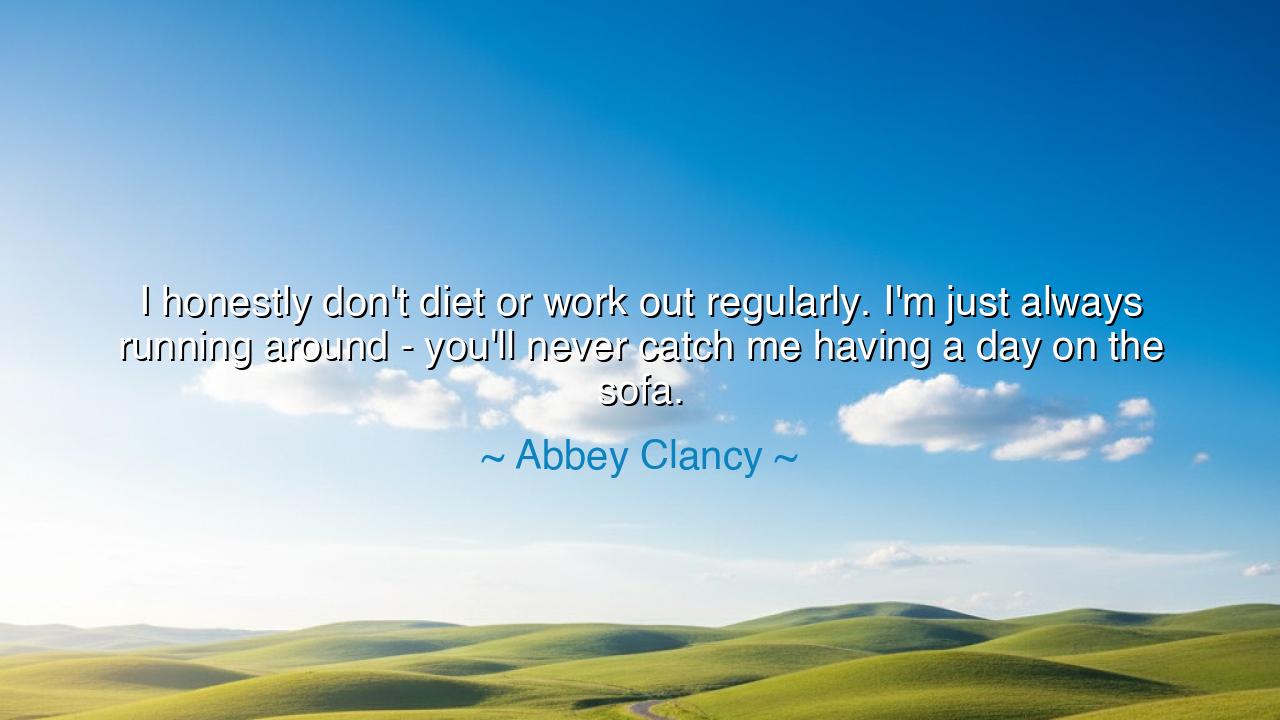
I honestly don't diet or work out regularly. I'm just always
I honestly don't diet or work out regularly. I'm just always running around - you'll never catch me having a day on the sofa.






The words “I honestly don’t diet or work out regularly. I’m just always running around — you’ll never catch me having a day on the sofa” by Abbey Clancy may sound light and carefree, yet within them lies a timeless truth about the rhythm of natural living — a truth the ancients knew well: that vitality comes not merely from planned effort, but from constant motion, from harmony between body and life itself. Abbey’s words are not a denial of discipline; they are a hymn to balance — to the art of living so fully, so energetically, that health becomes the byproduct of joy, not the burden of obsession.
When she says, “I don’t diet or work out regularly,” she speaks to a weariness modern souls know too well — the endless chase for perfection, the regimented pursuit of beauty measured in numbers and calories. In a world where wellness has become a competition, her statement carries rebellion: she chooses life over control, spontaneity over calculation. The ancients, too, taught this — that health is not found in rigidity, but in rhythm. The philosopher Heraclitus wrote, “Life is flux,” reminding us that harmony is not achieved through stillness, but through movement — the dance between effort and ease. Abbey embodies that dance.
Her words, “I’m just always running around,” reveal not restlessness, but vitality — the fire of one who lives immersed in the flow of experience. She reminds us that activity born of purpose sustains the spirit far more than any mechanical routine. The farmer tending his fields, the mother caring for her children, the artist chasing the dawn’s light — these are forms of living motion that feed both heart and body. The ancients called this praxis, the sacred fusion of doing and being. To move through life with intention, to remain engaged in the world’s rhythm — that is the truest form of exercise.
When Abbey adds, “You’ll never catch me having a day on the sofa,” she is not scorning rest, but idleness. There is a difference between repose and stagnation, between stillness that restores and sloth that dulls the soul. The ancients believed that idleness, when empty, corrodes the spirit. Aristotle warned that the body, like the mind, decays without use — that virtue itself is strengthened through motion. Abbey’s refusal to linger in inertia is not vanity, but instinct: she recognizes that energy must be circulated, like blood through the veins of existence.
Her insight also whispers of joy — of living through movement rather than obligation. To chase one’s purpose, to greet the day with motion, is to live close to the earth’s pulse. There is a grace in such living: laughter shared between tasks, errands that become small adventures, the quiet endurance that builds when one chooses to engage rather than withdraw. The wise of old saw in such lives the secret of longevity. They walked, not to count their steps, but to meet the world with open senses. They climbed, danced, built, and tended — and their strength came not from formula, but from fullness of living.
Yet in Abbey’s words also lies a quiet warning. She thrives not because she avoids rest, but because she moves in balance. To always “run around” without reflection can lead to emptiness, just as stillness without purpose can lead to decay. The lesson, then, is not to abandon structure, but to live with natural discipline — to find health in the flow of life, not the control of it. For true well-being is not born in gyms or diets alone, but in a spirit that moves, breathes, and rejoices in the simple rhythm of being alive.
So, dear listener, take this wisdom to heart: live in motion, but not in haste. Let your body be the vessel through which your spirit touches the world. Work with your hands, walk under the sun, laugh in your labors, and allow life itself to be your exercise. Rest when the heart is weary, move when the soul stirs, and you shall find the natural health that no regimen can promise — the harmony that comes from living fully, freely, and joyfully. For as Abbey Clancy reminds us, strength is not merely trained — it is lived.






AAdministratorAdministrator
Welcome, honored guests. Please leave a comment, we will respond soon